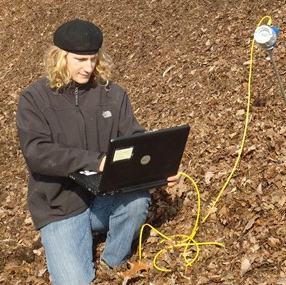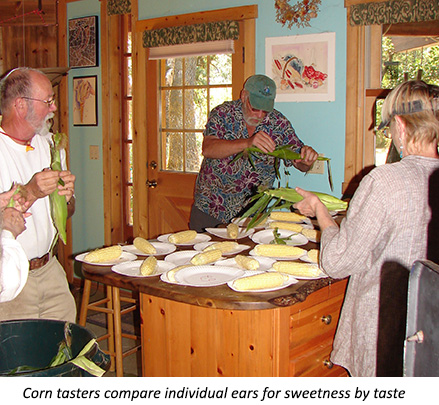NorthEast
Targeted mowing as a weed management method increasing allelopathy in rye (Secaule cereale L.)
Winter rye (Secale cereale L.) is an outstanding cover crop in its suppression of early season weeds. This suppression has been largely attributed to allelopathy; ryeís allelochemicals inhibit weed germination and growth. However, its lack of suppression of late season weeds and its inconsistent results between years and regions hinder the use of rye as a cover crop. This study, which is Part I of a 2-year project, explores a management method that may be used to increase weed suppression of rye by manipulating its allelopathic activity.
Developing "Organic-Ready" Maize Populations with Gametophytic Incompatibility: Year IV
 Maize (corn) is an incredibly productive and profitable crop that works well in organic crop rotations in many parts of North America. Since the release of transgenic (GMO) varieties of maize in the mid-1990s it has become increasingly difficult to grow uncontaminated organic maize or to find maize seed that is free of transgene contamination.
Maize (corn) is an incredibly productive and profitable crop that works well in organic crop rotations in many parts of North America. Since the release of transgenic (GMO) varieties of maize in the mid-1990s it has become increasingly difficult to grow uncontaminated organic maize or to find maize seed that is free of transgene contamination. Deploying microbes as a seed treatment for protection against soil-borne plant pathogens
 Plant diseases, especially those caused by soil-borne seed infecting pathogens, pose a serious threat to the production of both greenhouse and field crops. Conventional farming operations often use fumigants and chemical seed treatments, which can be harmful to human health and the environment, for controlling seed and seedling pathogens.
Plant diseases, especially those caused by soil-borne seed infecting pathogens, pose a serious threat to the production of both greenhouse and field crops. Conventional farming operations often use fumigants and chemical seed treatments, which can be harmful to human health and the environment, for controlling seed and seedling pathogens.Create Two Open-Pollinated, Sugary Enhanced Sweet Corn Varieties--Year 4
 Very little sweet corn grown commercially today is open pollinated. Farmers who wish to save their own seed have few if any good choices of varieties to grow. And the hybrids of today have been developed for conditions that are different from those found on most organic farms, as they were selected to rely on fungicides and pesticides, and to effectively utilize soluble synthetic fertilizers in large quantities.
Very little sweet corn grown commercially today is open pollinated. Farmers who wish to save their own seed have few if any good choices of varieties to grow. And the hybrids of today have been developed for conditions that are different from those found on most organic farms, as they were selected to rely on fungicides and pesticides, and to effectively utilize soluble synthetic fertilizers in large quantities.Snap Beans with Enhanced Nitrogen-Use Efficiency for Organic Production-Year 2
Snap beans with enhanced nitrogen-use efficiency
for organic production-Year 2
Can Organic Garlic Seed Stock Be Created Disease-free from the Production of Garlic Bulbils?
Can Organic Garlic Seed Stock Be Created Disease-Free From the Production of Garlic Bulbils?
Serious diseases of garlic have been imported from foreign sources and are now widespread within the US and Canada. Stem and Bulb Nematode (Ditylenchus dipsaci) in garlic seed (vegetative reproduction) will infest the soil and is impossible to eradicate using organic approved methods. It is a threat to other crops, including onions, potatoes, alfalfa, and strawberries. Infested land is substantially reduced in value, as the nematode may be transferred on equipment.
Organic Seed Production and Improvement Training Program for Vermont
There is an ever-increasing need for sources of organic seed and an interest by farmers and seed companies to build a local and regional supply of seed. This project addresses that need, and builds on a collaborative project conducted by Northeast Organic Farming Association-Vermont (NOFA-VT) and High Mowing Organic Seeds (HMOS) from 2002 to 2005, called the Organic Seed Production Technical Assistance Program.
Effect of Compost Extracts on Organic Seed Germination and Reduction of Weed Seed Expression
Organic growers consider weeds their number one problem in crop production. Organic growers whether they grow vegetables, grains, herbs, berries, or native plants are constantly on the lookout for finding new technology that reduce severity of weed problems and yield losses. One method is to assess whether the use of compost extract would lead to weed seed suppression for better crop seed emergence.
Measuring Active Carbon to Predict Seasonal Nitrate Mineralization on Organic Farms
Increasing organic matter in soils is one way to build soil heath. Cover cropping, compost, and manure additions increase soil organic matter and improve the soil’s ability to hold and supply nutrients, water, and air to plants and animals. Soil organic matter provides a bank of nutrients, including nitrogen, that are made available to plants through a process called mineralization.


